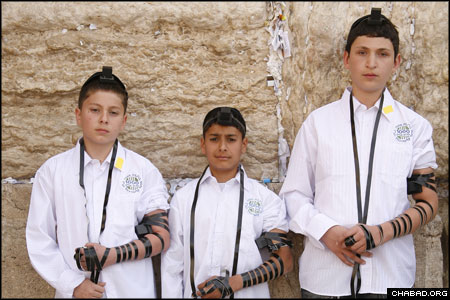Contemporary (1950 CE - Present)
Jingle Bells, Batman Smells
This parodic folksong is representative of the "culture"—texts, toys, uses of technology, social practices, and shared meanings—young people create when they selectively incorporate commercial products into their peer activities.

Jewish Women's Archive
The Jewish Women’s Archive (JWA), a national non-profit organization, seeks to collect and promote the 'extraordinary stories of Jewish women.'Imperialism in North Africa: Song, Amina Annabi
North African women have long, rich traditions of vocal and instrumental music. At weddings and other joyous occasions, including religious celebrations, female musicians sing, perform, and dance.

Bar Miztvah
The three boys in the photograph belong to a group of Israeli boys who came together at the Western Wall in Jerusalem in 2008 for a mass bar mitzvah celebration. The orthodox social service organization Colel Chabad arranged the celebration for orphans and needy families.
Imperialism in North Africa: Autobiography, Leila Abouzeid
In Morocco, after 1912, the colonial regime eschewed, for the most part, introducing overt changes into Islamic personal status law.
Imperialism in North Africa: Song, Amina Annabi
North African women have long, rich traditions of vocal and instrumental music. At weddings and other joyous occasions, including religious celebrations, female musicians sing, perform, and dance.
Dona Marina, Cortes’ Translator: Poem, La Malinche
A well-known Chicana poem about Malinche. Tafolla took inspiration from the famous 1967 poem of the Chicano movement, “Yo Soy Joaquín,” but rewrites from an explicitly feminist perspective.
Dona Marina, Cortes’ Translator: Poem, Como Duele, 1993, Women in World History
One of the earliest meditations on Malinche and her meaning published by a Chicana in the United States. This narrative explores Malinche’s fate and her abilities to negotiate difficult and competing cultural demands.
Dona Marina, Cortes’ Translator: Nonfiction, Octavio Paz
This essay, which seeks to explain modern Mexican sensibilities by examining the phrases “hijos de la chingada” and “malinchista,” presents La Malinche as violated woman—part victim, part traitor to her nation.
Imperialism in North Africa: Law, Code of Personal Status
In 1956 one of the most revolutionary family law codes in the Arab or Islamic world was proclaimed in the newly independent Tunisian state which, paradoxically, had not suffered a political revolution in the way that colonial Algeria would.